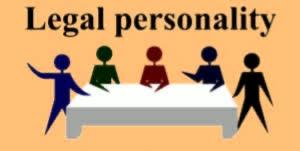 Juristic Personality
Juristic Personality
1. Concept of Legal Personality
In every legal system, there must be entities that can hold rights and bear duties. These entities are called legal persons.
A legal person may be:
• A natural person (human being) – exists by nature, recognized by law.
• A juristic person (artificial person) – created by law, such as companies, states, and institutions.
Definition (Salmond): A person is any being whom the law regards as capable of rights and duties.
Statutory Definition:
• Section 11, IPC and Section 2(26), BNS – “Person” includes companies, associations, and bodies of persons, whether incorporated or not.
2. Natural vs Juristic Persons
• Natural Persons: Born with personality; e.g., citizens, residents.
• Juristic Persons: Granted personality by legal recognition; e.g., corporations, municipal bodies, universities, religious institutions.
3. Types of Juristic Persons
A. Corporations:-A corporation is an artificial legal person with separate identity from its members.
(i) Corporation Sole
• A single office that continues despite change of holder.
• Examples: President of India, Governor of a State, CAG.
• Salmond calls it “two persons in one” — the human and the permanent office.
(ii) Corporation Aggregate
• A group of persons forming one legal entity.
• Created by charter, by statute, or by registration.
• Examples: RBI, Infosys Ltd, BMC.
B. Corporate Personality
• Case: Salomon v. Salomon (1897) – Established that a company is a separate legal entity.
• Rights: Own property, sue and be sued, enter into contracts.
• Acts through agents/directors.C. Religious Institutions as Juristic Persons
• Pramatha Nath Mullick v. Pradyumna Kumar Mullick (1925) – Hindu idols recognized as legal persons capable of owning property and suing.D. The State
• Under Article 300, Constitution of India – Union and State governments can sue and be sued in their own names.
4. Entities Without Separate Legal Personality
• Unincorporated Associations – Social clubs, trade associations; cannot sue in own name.
• Partnership Firms – Not distinct legal persons, but can sue/be sued if registered.
• Registered Trade Unions – Recognized by statute; have limited rights.
5. Special Situations
A. Double Capacity
One human can act in multiple legal roles (e.g., individual & trustee) but still has one legal personality.
B. Legal Status of a Dead Person
• Legal personality ends with death.
• Certain rights remain protected: dignity of burial, protection from defamation, enforcement of will.C. Legal Status of an Unborn Child
• Can hold certain rights subject to birth.
• Example: Section 13, Transfer of Property Act – property can be transferred for benefit of unborn.
6. Theories of Corporate Personality
1. Fiction Theory – Corporation is an artificial creation of law (Savigny).
2. Concession Theory – Personality exists because the state allows (Dicey, Salmond).
3. Realist Theory – Corporation is a real social group (Gierke, Maitland).
4. Bracket Theory – Corporate name is just a symbolic bracket for members (Ihering).
5. Purpose Theory – Personality exists only to fulfill specific purposes (Brinz).
6. Hohfeld’s Theory – Only humans truly have rights; corporation is a legal method.
7. Doctrine of Lifting the Corporate Veil
General Rule: Company is separate from members (Salomon).
Exception: Courts may “lift the veil” to find real persons controlling the company.
When Applied:
• Fraud or improper conduct (Gilford Motor Co. v. Horne, 1933)
• Evasion of obligations (Jones v. Lipman, 1962)
• Public interest or prevention of crime (DDA v. Skipper Construction, 1996)
8. Corporate Liability
• Civil Liability – For breach of contract, negligence, etc.
• Criminal Liability – For offences where fine is applicable; directors/officers may also be liable.
• Cases: Satyam Scandal (2009), Bhopal Gas Tragedy (1984).
Conclusion
The concept of juristic personality is one of the cornerstones of modern law. By granting legal recognition to artificial entities like corporations, institutions, and even religious idols, the legal system allows them to own property, enter into contracts, and be held liable — just like natural persons. This concept facilitates commerce, governance, and social organization. However, the law also ensures accountability by doctrines like lifting the corporate veil, ensuring that legal personality is not misused as a shield for fraud or injustice.
✓ To start your preparation for Judicial Services Examination at home, drop a message on WhatsApp +91 8840961324 or call us on +91 9151591324
At Theory of Abrogation, we equip you with everything you need:
•Subject-wise expert classes
•Mock test series
•Legal current affairs
•Personalized mentorship for interview preparation“Your law degree is your foundation, but your preparation is what will build your success.”
Join Our New Batch Now!
Prepare smart. Prepare with Theory of Abrogation.
Contact Us:
B-109, Commercial
Complex Dr. Mukherjee
Nagar, Delhi-09
+91 9971399324 | +91 8840961324
[email protected]
